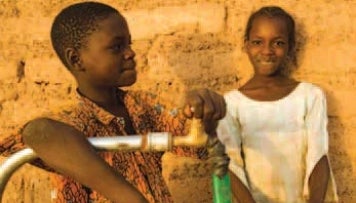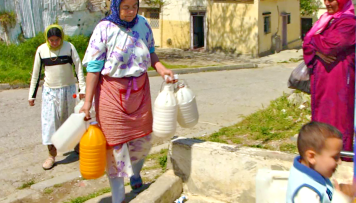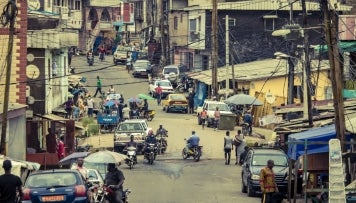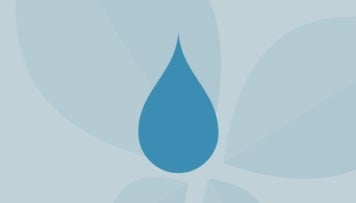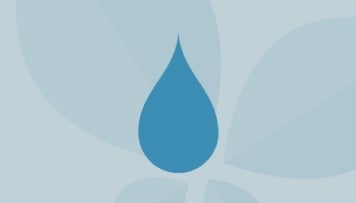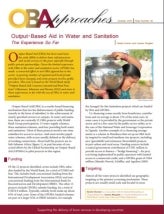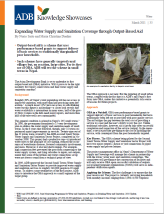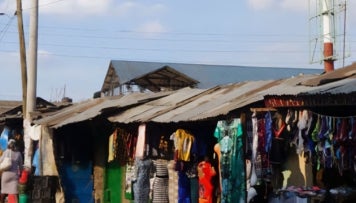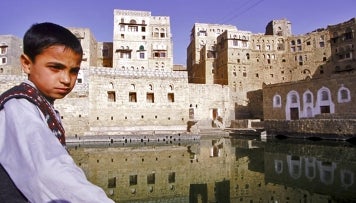
A look at how output-based aid (OBA) is being used to help the urban poor access water services
The theme of World Water Day (WWD) 2011 is Water for Cities: Responding to the Urban Challenge. Now in its 18th year, WWD is an annual opportunity to remind all of us about an ongoing global problem for many, the lack of access to clean and affordable water. According to the World Health Organization:
“1.1 billion people globally do not have access to improved water supply sources whereas 2.4 billion people do not have access to any type of improved sanitation facility. About 2 million people die every year due to diarrhoeal diseases, most of them are children less than 5 years of age.”
Urbanization, the movement of people from the rural to urban areas, has seen cities grow dramatically in both developing and developed economies. In developing countries, the lack of access to clean water and sanitation services is painfully illustrated in places like Kibera (Nairobi, Kenya), known as the biggest slum in Africa and one of the biggest in the world. The Kibera experience provides a snapshot of what the lack of water resources looks like for slum-dwellers on a day-to-day basis:
- Until recent projects funded by the municipal council and the World Bank made clean water available and affordable (Ksh3 per 20 liters), Kibera’s population relied on water collected from the Nairobi dam. The water from the dam is not clean and made the dwellers vulnerable to contracting cholera or typhoid; and
- Most dwellings in Kibera do not have toilet facilities, relying instead on latrines which are just holes in the ground and each one shared by up to 50 shacks.
Output-Based Aid in the water sector
The Global Partnership on Output-Based Aid (GPOBA) has been piloting OBA approaches since 2003 as one way to help the poor gain access to essential services. A results-based approach, OBA can help facilitate access to basic infrastructure (water, energy, sanitation, transport) or social (health, education) services for the poor by tying subsidy payments to the achievement of pre-agreed outputs. In water projects, a typical output could be a yard tap or kiosk connection to the water supply service for a target household. As with all OBA projects, the outputs are independently verified before payment is made to the service provider.
A recent review of the experience so far with OBA in water and sanitation found 22 OBA projects with subsidies funded by the World Bank for a total of US$82 million and subsidies funded by GPOBA for a total of US$54.9 million. Water and sanitation projects currently make up around 43 percent of GPOBA’s project portfolio, mostly in sub-Saharan Africa.
OBA projects in cities around the world
GPOBA’s urban water portfolio has a total value of about US$28 million, expected to help over one million people worldwide gain access to safe, reliable water and sanitation services. The portfolio has already delivered over 150,000 verified outputs, including yard taps, public water points and individual household connections, in countries ranging from Cameroon to Yemen.
- In Cameroon, only about a third of the national population has access to piped water. A GPOBA pilot with a grant of over US$5 million aims to deliver new piped water connections for about 40,000 poor households. The project is the first GPOBA project to use an affermage contract, a model which transfers the operation of a national utility to a private operator while investment remains the government’s responsibility.
- In Indonesia, two projects with grants totaling about US$ 5 million aim to help low-income communities in Jakarta and Surabaya gain access to clean water. In Jakarta, unconnected households can pay as much as 15 percent of their household income on water. Often, the water that they do have access to is overpriced by informal providers or is collected from shallow wells and contaminated. In Surabaya, the pilot project aims to extend piped water access to over 77,000 people.
- Although Morocco is a middle-income country with good access to clean and affordable water for most of the population, there are some poor communities in peri-urban settlements that faced the “last mile” paradox. So, although the water infrastructure was there, the cost of connecting to the network presented a barrier to access for poor households. In partnership with the government and the operators of water utilities in Casablanca, Meknès, and Tangiers, a GPOBA grant of US$7 million is helping over 11,000 households connect to local water networks.
- In the Philippines, the Manila Water Supply pilot will help almost 100,000 people gain access to clean, potable water. So far, 45 projects have been completed and benefited 11,000 households. As well as enjoying the benefit of 24-hour access to clean water supply, the target households have also reported financial savings and a reduction in the incidence of water-borne diseases. Encouraged by the initial success of the Manila project, the Government of the Philippines is exploring the idea of a national OBA facility to help ensure access to water for people across the country.
- In Uganda’s capital city, Kampala, water connections for the poor will help bring access for communities in targeted urban settlements up to almost 100 percent by the project’s end.
- In Yemen, a GPOBA grant of US$5 million will help the poor in urban and peri-urban areas gain access to safe drinking water and sanitation services. The pilot project is also being used as a model to show that tapping into private sector expertise and encouraging competition in the water sector can both serve the poor and help to reduce infrastructure costs.
Although OBA is not the answer for every context, the pilots so far show encouraging signs that where an enabling environment exists – a regulatory structure with clear policies for setting sustainable tariffs, an experienced private sector that is able to pre-finance projects and an implementing body that is able to handle processes including monitoring and verification – then OBA can make an impact as a way to help the poor enjoy the benefits of reliable and clean water services. On World Water Day 2011, OBA is an innovative approach that communities, development partners, and governments alike should consider as one way to address an urgent global challenge, access to clean water.
